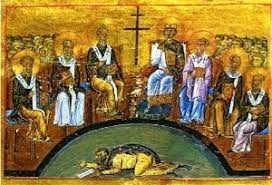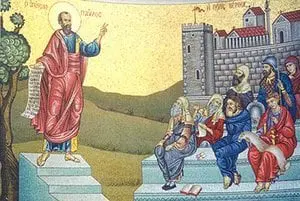A modern reading and analysis of the poetic form of Arius’s peculiar “Arian Bible” entitled “Thalia” is found in Rowan Williams and William Bright (cf. Bright, William. The Historical Writings of St. Athanasius according to the Benedictine Text, Oxford : Clarendon, 1881, pp. 259-60, cf. Williams, Rowan Arius: Heresy and Tradition, Revised Edition, Grand Rapids: Eerdman’s, 2002, pp. 62-66, 98-116, cf. West, ML The Meter of Arius’ “Thalia.” – In: The Journal of Theological Studies, 33, Oxford, 1982, pp. 98-105) . Thalia /blooming/ was the muse of comedy and light poetry. She is the wife of Apollo, and their children are the Coribans. She is depicted with a comic mask in her left hand and a shepherd’s gag in her right head with a laurel wreath) which can be translated as “abundance”, “banquet”, “feast”. The work is written in poetic form to facilitate the memorization and oral dissemination of Arian ideas. Fragments of the work are preserved in the works of his opponent, the Alexandrian church leader Athanasius, who gives us the first description of the Arian doctrine in the Word against the Arians (1.5-6) - a paraphrase intertwined with many negative comments, making it very difficult to sift out the real words of the heresiarch from Athanasius’ notes on them. Interestingly, St. Athanasius was one of the few (both anti-Arians and followers of heresy) in the fourth century who quoted Arius in his work, e.g. in their accusations against the followers of Eusebius, “exalted for defending the Christ-fighting heresy who dare to draw up a definition of the faith; and when they themselves are judged as guilty, like Caiaphas, they begin to judge for themselves, they compose Thalia, wanting to believe them when they themselves do not know what they believe in. ”- St. Athanasius the Great, Regional Message to the Bishops of Egypt and Libya against the Arians (Epistola encyclica ad episcopos Aegypti et Libyae contra Arianos, PG , pp. 25, col. 537-594). Second, a more direct quotation from “Thalia”, we find in St. Athanasius ep. Alexandrian in “On the Councils of Rimini and Seleucia” (15):
Wisdom became Wisdom by the will of the Most Wise God. Because He thinks in countless aspects. He is Spirit, Power, Wisdom, glory of God, Truth, Image and Word.
Understand that He thinks of Himself as Light and Light.
He who is higher is able to give birth to the Son, but no one is more important, or higher, or greater.
By God’s will, the Son has the greatness and characteristics he possesses.
His essence since and from whom, and since then – are all from God.
He, though a strong God, glorifies his superior…
In short, God is inexpressible to the Son.
For, He is in Himself what is, and it is, unspeakable, So that the son does not understand any of these things or does not have the understanding to explain them.
Since, it is impossible for him to comprehend a Father, Who is Himself.
Since the Son himself does not even know his own nature,
Because, being a Son, He really exists by the will of Father.







